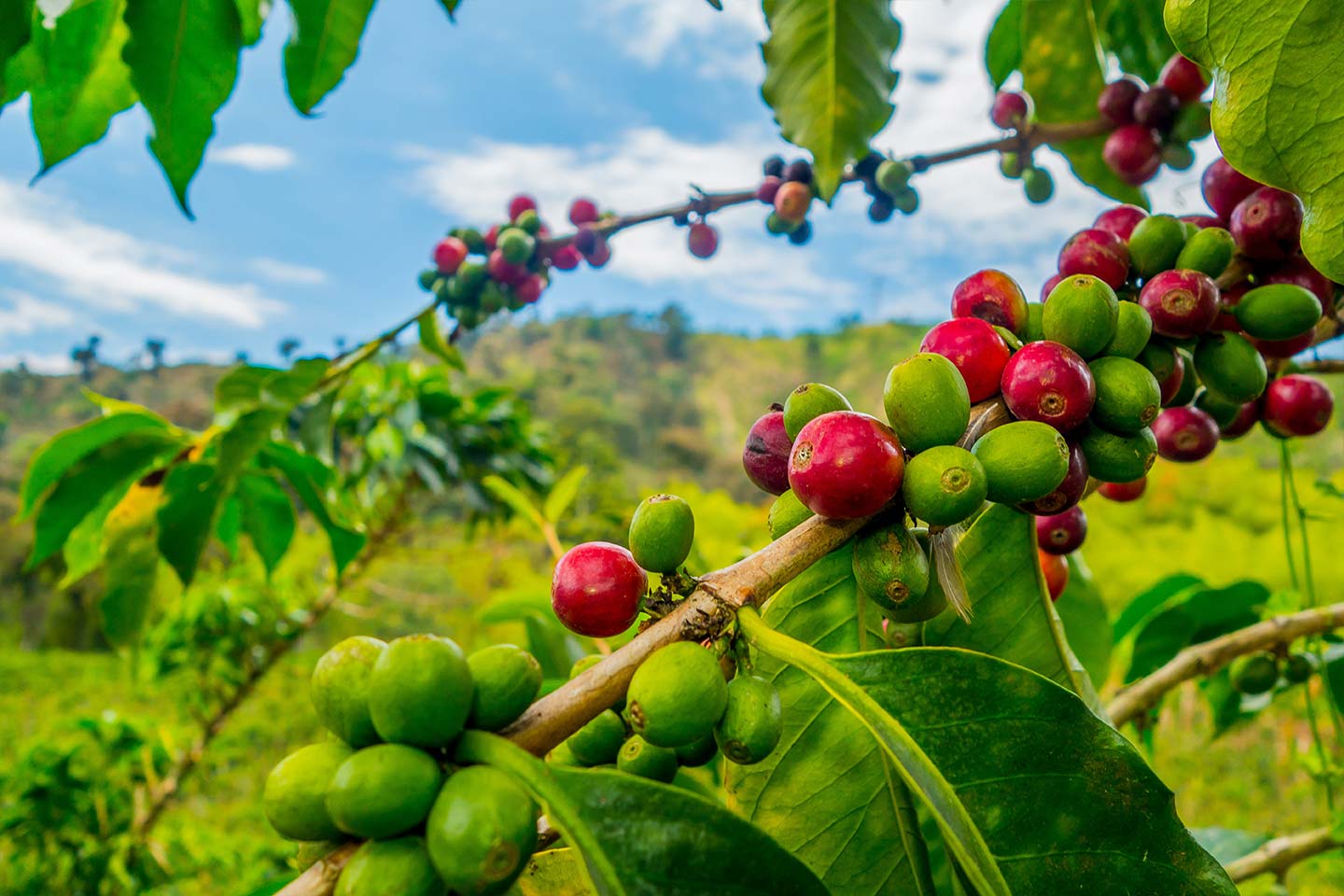LEGEND
The path of coffee begins with legends - as it should be for things that have a special power and meaning in our lives. Who really discovered coffee – was it Arab hermit Sheik Omar, or Coptic monks from the Ethiopian monastery in the area Cuff, or Yemeni shepherd Kaldi - we won’t know. And probably this acquaintances with coffee happened independently from each other. And today we can perhaps be infinitely grateful for such a wonderful discovery!
Named "cafe" in the name of the province of Kaffa (or, in another version of the origin of the word "coffee" - which means in Arabic "be strong" and "be bold" because it is so becomes a man who consumes beans or infusions), coffee traveled around the world.
EAST TOUR
There were changes in methods of preparing coffee. In the beginning - coffee balls with fat or honey, covered with water, first fresh and then also dried coffee beans, "coffee wine". And only in the 14th century people began to roast coffee beans, pound them in a mortar into a powder and brewed a drink from it. First, as a drug (even Avicenna recommend coffee to his patients way back at the beginning of 11th c.), and then as brisk drink, coffee consumption spread throughout the Muslim world, slowly outgrowing in a whole culture.
Like all great discoveries and important phenomenon for civilization, coffee initially suffered from censure and prohibition. From the mid-15th century in the East drinking coffee in the group of interlocutors in the shade of trees or on the veranda became more and more popular. Coffee shops became popular. This meant shifting of coffee culture to a new level - social. That is why rulers began to see a threat to the government in coffee drinking. After all, coffee made people brisk and they were inclined to pursue active discussions, including political topics. Also clergy were dissatisfied, because now faithful spent significantly less time in prayer, but instead conducted small talks over coffee. There are cases when in Mecca, Istanbul and in other cities coffee shops and supplies were destroyed by the order of sultan, coffee-lovers were even thrown into the sea in a bag or had their tongue cut.
But consumer demand has surpassed all the prohibitions. Coffee victory in the Eastern world marked the opening of the first public café in Istanbul in 1554 by two Syrian merchants and the rapid increase in its demand. Respect for coffee grew, it became known as "milk of chess players and thinkers", drink of warriors and philosophers. It quickly became the national drink of Turkish, coffee has spread further, helped not only by buyers economic motives, but that time power of the Ottoman Empire, and thus its cultural influence on Europe. Coffee was destined to become a global culture.
EUROPE CONQUEST
Europeans knew about coffee since the mid-16th century from the descriptions of this plant by travelers to the East and scientists, botanists and physicians. And only in about a hundred years later in Europe began to open the first coffee shops: in Italy - 1647 (Venice) in England - 1650 (Oxford), 1652 (London), France - 1672 (Paris), Germany - 1686 (Regensburg), 1721 (Berlin). Coffee as expensive pleasure first gains popularity at the courts of princes, afterwards - in the circles of aristocrats, merchants and officials, and then among the middle class.
Naturally, in European countries coffee didn’t escape from harassment and restrictions. How could a legend of Arab culture painlessly settle in a conservative Christian Europe in the times of acute confrontation between the Church and Islamic world? Besides, coffee created a significant competition to traditional drinks (tea, beer and ale) and to traditional ways of spending time among the people. Whether European pragmatism won (because the decision to impose high taxes on coffee trade didn’t reduce, but rather increased the scope and popularity of coffee consumption) or coffee was born under a lucky star – but very soon coffee became prima on the stage of trade and consumer culture in Europe.
GLOBAL EXPANSION
With the spread of coffee culture to the West there was a need to create artificial coffee plantations, as the amount of exported wild plants grain no longer met the demand of this product.
The Arabs not without reason call coffee "daughter of Yemen" because it was spread from here. Here coffee for the first time was cultivated on the plantations created by human. The monopoly on the export of coffee belonged to the Arabs until the early 18th century when from 1737 the French began to import coffee to Europe.
Here begins a new stage in the spread of coffee culture through the world - industrial. At first the Arabs, to meet fierce demand, secretly created first coffee plantations in Malaysia. Afterwards the Dutch, who stole plants from the Arabs, began to cultivate coffee in their colonies in Indonesia. Than the French having stolen plants from the Dutch - developed coffee plantations in Martinique, in their possessions in the Caribbean. Spain, Portugal and England also began to create coffee plantations on their colonial territories (Brazil, Jamaica, Ceylon, Java, Bourbon, San Domingo, Guadeloupe). At the end of the 18th century, coffee was grown throughout the tropics. Coffee consumption was rapidly growing, and in the early 20th century the scope of trade amounted to about one million tons.
KULCHYTSKY AND VIENNA
By what paths did coffee find its way to our territories in its worldwide journey during many centuries? When and under what circumstances does coffee consumption in Ukraine originate? As you know, history loves paradoxes. And a legend of Viennese coffee or rather the history of coffee tradition in Austria is one of them. The main character in this story was Ukrainian with world-known name - Yuri Kulchytsky. History decreed that coffee drinking tradition came to our land from the Austrian Empire, in which Ukrainian made the most to popularize coffee! But everything in order.
Therefore, native of Ukraine Yuri Franz Kulchytsky was born in 1640 in a village Kulchytsi Shliahetski near Sambir. According to one version, he was a Cossack at Sich, who after the Turkish captivity (where he learned the language and customs, in particular he get used to coffee) got a job of translator in "Oriental trading company" founded by Viennese merchants. The other versionr - Kulchytsky was not a Cossack, but ann Austrian diplomat, and discovered coffee as medications against migraine. But it is known that in 1678 he settled in Vienna, where he became an importer of oriental goods. And he was chosen by destiny for unusual adventures. Usually legends in time turn into "real" history, and it’s opposite with Yuri Kulchytsky. "Feat of Kulchytsky" is really epic, thrilling story - and that’s why it is so like a legend. In 1683 siege of Vienna by the Turkish army of about 200,000 soldiers was lasting. Yuri Kulchytsky (who spoke fluently Polish, Serbian, Turkish, German, Hungarian and Romanian Languages), thanks to his knowledge and ability to personate and extraordinary courage, stole through the camp of the enemy in the guise of a Turkish merchant, delivered letters from Vienna about the siege and the need in assistance to Duke Lotarynґskyi Charles V and came back with good news for the Viennese, who were about to surrender the city to the Turks. The city went up morale and faith in victory. Soon after a fierce fighting allies defeated the Turks and lifted the siege of Vienna.
Where is coffee here? - You may ask. In the five hundred (in another version - 300) bags left behind by the Ottoman army, along with thousands of sacks of grain, cattle and other trophies, so appropriate weary after two-month siege Viennese. But an incident happened only with coffee. No one knew what to do with so many grey and green beans. However, Kulchytsky knew! And exactly these bags of unknown for Austrians beans he took as a reward for his feat from the city commandant Shtarenberґa graph. Along with the title of "imperial interpreter" and honorary citizen of Vienna, permanent salary and accommodation. And most important - exceptional conditions for coffee sale: exemption from taxes for 20 years!
COFFEE IN VIENNA
Here begins the history of Viennese coffee.
First it was coffee "in Turkish," which Yuri Kulchytsky carried around the city and sold for kreutzer. But the Viennese didn’t fancy it much. Eventually kavar invented another "recipe" of Turkish coffee - with honey (and later sugar) and milk. And this variation has taken root in Vienna as its own and became known as "Viennese coffee".
Some time Kulchytsky allegedly was selling coffee in a tiny café in the center of Vienna, entitled "Vienna trophy." Later, in 1686, he opened a new one, larger, called "The Blue Bottle Coffee House", which became very popular, and it is known in history as the first coffee shop in Vienna. The story about the George Kulczycki heroism was published by Gottfried Ulrich, Catholic priest in 1783 in his book "History of the second Turkish siege", and still a lot of people consider it to be true. Although there are other versions of launching coffee shops in Vienna. Modern researches designate the name of John Deodat - Armenian merchant who allegedly opened the first coffee shop in Vienna in 1685 (in another version - it was the Armenian Isaak de Luca).
In one we can be sure: Ukrainian Yuri Kulchytsky like no other, contributed to popularization of coffee consumption culture in the Austrian Empire. These are not just legends (or maybe still true stories?), which are still alive, but also honor of his name in the history of coffee spread coffee in Europe. In 1885, at Kolshitskiґasse street at the corner of the house where was the coffee shop Tsverina named after Kulchytsky, a bronze statue of George Kulchytsky with tray, cups and coffee pot in his hands was installed. And until recently, every year in October Viennese kavari staged celebrations in honor of Kulchytsky and hung his portraits in the windows of their coffee shops.
Viennese coffee shops culture as a typical social phenomenon is officially included in the UNESCO National Intangible Cultural Heritage list since November 10, 2011. Like a hundred or two hundred years ago - when visitors were attracted not only by delicious and expertly prepared coffee, but also by unique Viennese pastries (without which coffee was not served) and the latest press - today Viennese coffee shops enchant with its unique atmosphere and are the pride of the Austrian capital.
COFFEE IN LVIV
From Austria the public culture of coffee consumption has spread also to our land. After the first partition of Poland, Eastern Galicia became a part of the Austrian Empire, and the Viennese traditions of drinking coffee quickly reached Lviv. Although the first coffee shops in Ukraine (and in Polish-Lithuanian Commonwealth) were founded by Turks a century ago - in 1672 in Kamianets-Podilskyi, but coffee played the special role for Lviv, it became a cultural phenomenon and a part of the spirit of this ancient city.
First coffee was served in confectioneries. Well-known was Levakovskyi confectionery, opened in the late 18th century. And only in the 19th century coffee shops in the modern sense of the word began to appear in Lviv. The documentary mentions that in fact the first coffee shop was the "Vienna", built by Carl Hartman in 1829 in Val Hetmanski Valy (present Svobody avenue). In the 19th century popular Lviv coffee shops were: "Vienna", "Teatralna", "Tsentralna", "Monopolna," "Amerykanska," "Shtuka", "Kryshtaleva", "Evropeiska", "Narodna Hostynnytsia", "Pekelko", "Café de la Paix »and others. Intellectuals, bohemians, city officials and, of course, the Austrians, for whom it was a well-established tradition gathered here.
LVIV COFFEE SPIRIT
Lviv coffee shops became peculiar city cultural centers: there were intellectual debates and artistic conversations, one could read the latest press and magazines, including foreign ones. Around this or that coffee shops different “clubs” were created. Politicians discussed state affairs; writers, artists and composers were inspired and even wrote here their works of art. Literally, in the 19th - early 20th century in Lviv coffee houses (as in theaters and other public places) cultural environment of the city was being created.
Today Lviv is a coffee capital of Ukraine. And it has good reasons for that - not only in the historical context. Two largest Ukrainian coffee producers are located in Lviv. Lviv coffee shops are one of the most attractive tourist destinations along with architectural and historical monuments. Here, in Lviv, coffee festival “Na kavy do Lvova” is held every year. In Lviv coffee is drunk in a special way - without hurry, enjoying every sip and finding inspiration, transforming drinking coffee in a pleasant ritual. It is in this unique city "go to drink coffee" – that’s something more, that is, among other things, also means being Lviv citizen!
Ltd. "Wiener Kaffee"


